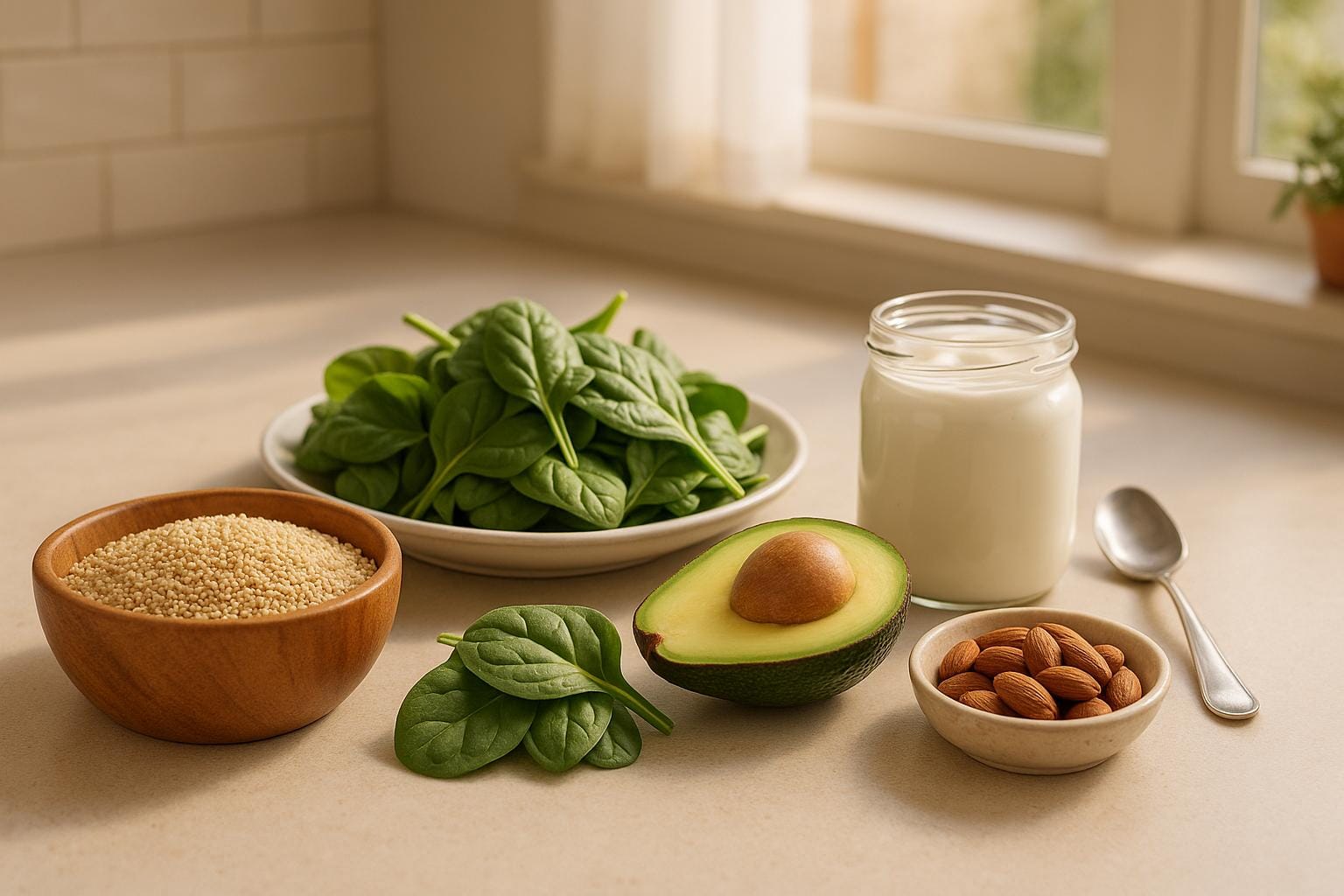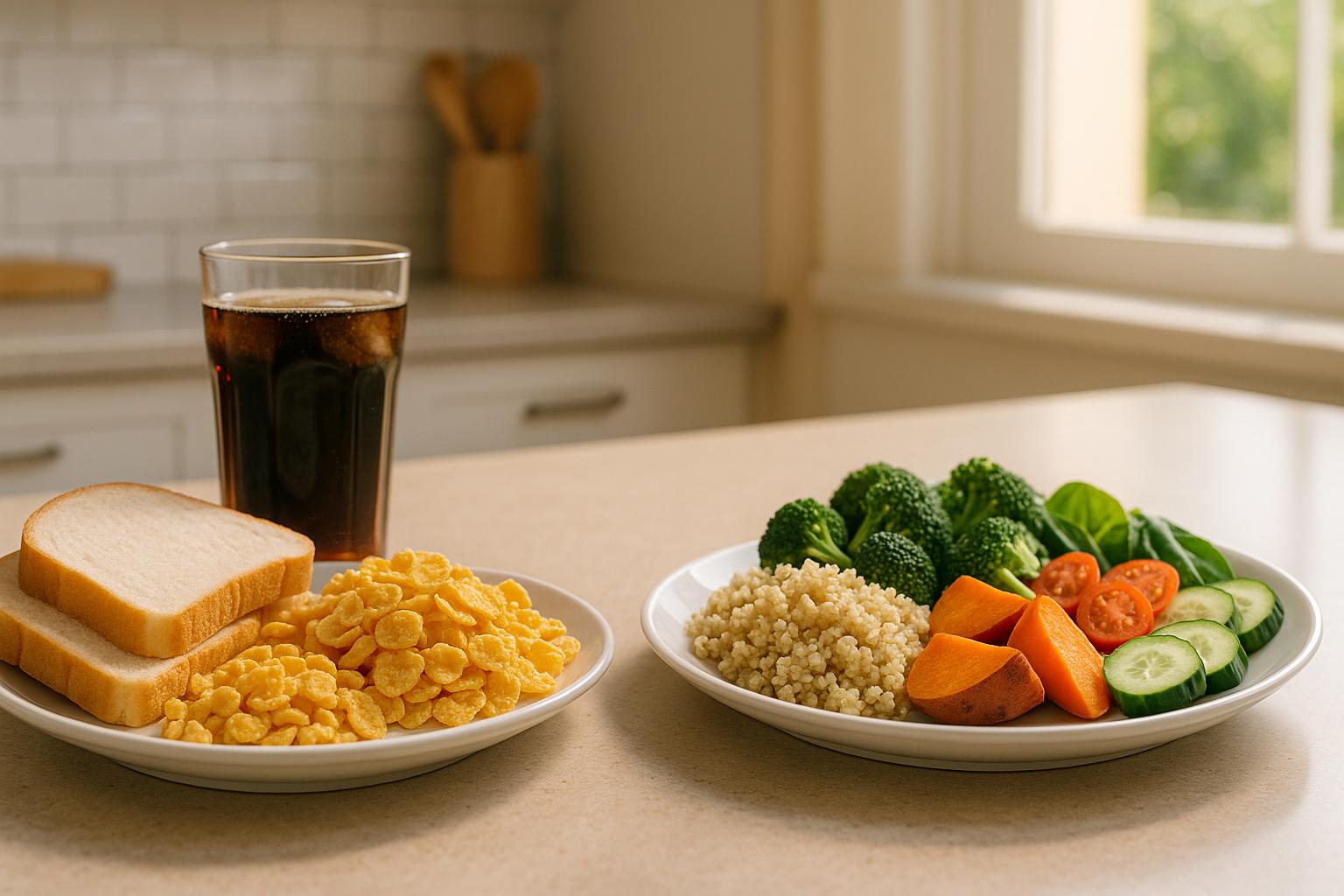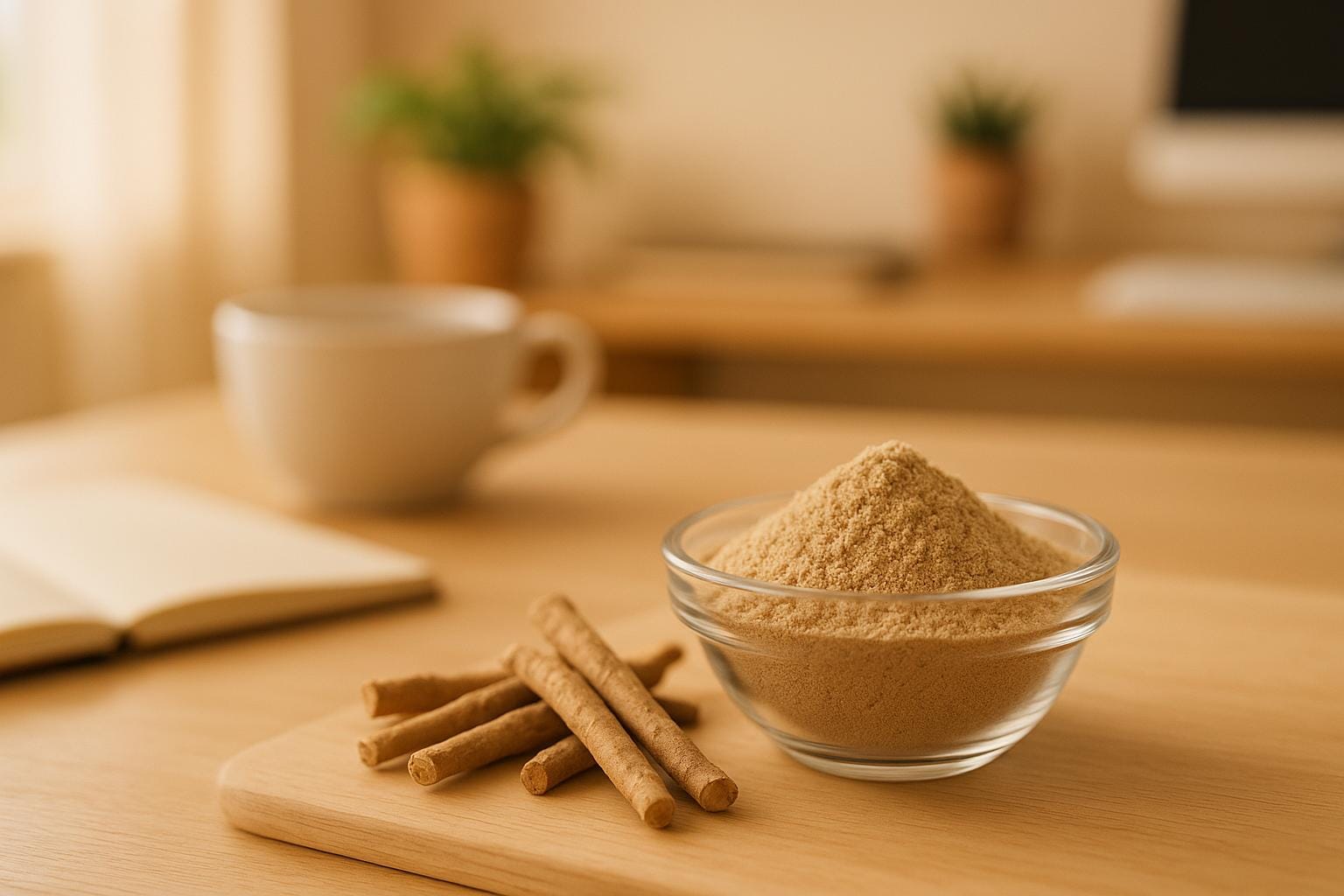Your brain depends on glutamine to produce key neurotransmitters like glutamate (for energy) and GABA (for relaxation). Low glutamine levels can lead to brain fog, mood swings, and reduced mental energy. While your body naturally produces glutamine, stress or illness can increase your needs. Adding glutamine-rich foods to your diet can help maintain mental clarity and support cognitive function.
Here are five excellent sources of glutamine:
- Chicken: High in glutamine (5.5g per 4.5 oz serving) and rich in brain-supporting nutrients like choline and vitamin B6.
- Beef: Delivers 1.5g of glutamine per 4 oz serving, along with iron, B12, and zinc for brain health.
- Eggs: Each egg contains 0.7g of glutamine and provides choline, selenium, and lutein for memory and cognition.
- Yogurt: Offers 1g of glutamine per 6 oz serving, plus probiotics that support the gut-brain connection.
- Tofu: A plant-based option with 1.7g of glutamine per 3.5 oz serving, along with isoflavones that may boost memory.
Quick Comparison
| Food | Glutamine per Serving | Key Nutrients for Brain Health | Best For |
|---|---|---|---|
| Chicken | 5.5g (4.5 oz) | Choline, B6, B12, iron | Omnivores |
| Beef | 1.5g (4 oz) | Iron, B12, zinc | Omnivores |
| Eggs | 0.7g (1 egg) | Choline, selenium, lutein | Vegetarians |
| Yogurt | 1g (6 oz) | Probiotics, calcium, protein | Vegetarians |
| Tofu | 1.7g (3.5 oz) | Isoflavones, folate, plant protein | Vegetarians/Vegans |
Including these foods in your meals can naturally boost glutamine levels and support brain health. Start small by adding one or two options to your routine, and pair them with fruits, veggies, or whole grains for balanced nutrition.
10 Best Glutamine Foods - Ranked From Highest To Lowest
How Glutamine Supports Brain Health
Glutamine plays a crucial role in keeping your brain functioning at its best. It serves as the raw material for neurons to produce two key neurotransmitters: glutamate and GABA. Here's how it works: astrocytes, a type of brain cell, release large amounts of glutamine, which neurons then convert into glutamate and GABA.
While glutamate stimulates and energizes neurons, GABA has the opposite effect - it helps calm them down. This balancing act is vital for efficient brain energy use. However, when glutamine levels dip, this cycle can falter, potentially leading to issues like brain fog or mental fatigue, especially during times of stress. Essentially, glutamine is the fuel that powers both mental activity and relaxation.
Recent studies have highlighted glutamine's role in cognitive performance. For instance, research involving mice found that glutamine supplementation (150 mg/kg chow) helped prevent stress-related cognitive issues and even delayed signs of Alzheimer’s disease. These findings emphasize how maintaining this neurotransmitter cycle can protect cognitive function under stress.
Glutamine also shines when it comes to stress management. As a precursor to GABA, it helps soothe overactive nerve cells often associated with anxiety and stress. Research on athletes reveals that glutamine supplementation can curb cortisol spikes during intense training sessions, leading to quicker recovery and reduced post-exercise stress.
"Known as the 'calming amino acid,' L-Glutamine has been shown to effectively reduce stress-related anxiety symptoms and support mental clarity." – APH Science
Taking 2–5 grams of glutamine daily may also help boost GABA and serotonin levels, which are key players in mood regulation.
Beyond neurotransmitter production, glutamine helps detoxify ammonia, a harmful byproduct that can damage neurons if it builds up. The brain relies on glutamine synthesis to neutralize ammonia, clearing out metabolic waste and keeping neurons safe.
However, disruptions caused by stress, illness, or poor nutrition can throw off the delicate glutamate/GABA-glutamine cycle. Such imbalances have been linked to neurological conditions like epilepsy, hepatic encephalopathy, and manganese encephalopathy. Maintaining steady glutamine levels is critical for keeping your brain healthy and functioning smoothly.
1. Chicken
Chicken is one of the best sources of glutamine, a key nutrient for maintaining brain health. This versatile protein not only provides a generous amount of glutamine but also delivers other important nutrients that support cognitive function.
Glutamine Content per Serving
A 4.5-ounce serving of roasted chicken packs about 5.5 grams of glutamine, making it a powerhouse for brain nourishment. If you’re looking for an even richer source, chicken legs with skin contain a whopping 9,979 milligrams of glutamine per leg. Beyond glutamine, chicken is loaded with nutrients that benefit the brain.
Nutritional Benefits for Brain Health
Chicken is a treasure trove of brain-friendly nutrients. It contains choline (65 mg per 3.5-ounce serving), vitamin B6 (0.5 mg), vitamin B12 (0.42 mcg), tryptophan, and iron. Choline is crucial as it helps produce acetylcholine, a neurotransmitter involved in memory and learning. Vitamin B12 plays a role in regulating serotonin and dopamine levels, which are important for mood and emotional balance. Tryptophan aids serotonin production, supporting mood stability, while iron ensures efficient oxygen transport, reducing the risk of cognitive fatigue.
Dietary Suitability and Additional Benefits
Chicken is an excellent protein choice for those following an omnivorous diet. It contains amino acids like glycine and glutamine, which can have a calming effect on the nervous system, potentially easing anxiety and promoting relaxation. To retain its nutritional value, consider grilling, baking, or stir-frying chicken. Pair it with a variety of fruits, vegetables, whole grains, and healthy fats to create a balanced meal that supports overall brain health.
This article is for informational purposes only and is not intended as medical advice. Please consult a healthcare professional before starting any new fitness or wellness routine.
2. Beef
Beef is another excellent way to boost your glutamine intake, offering key nutrients that support brain health. Known for its high glutamine content, beef plays a role in maintaining cognitive function and overall mental performance.
Glutamine Content per Serving
Beef packs a punch when it comes to glutamine. A 4-ounce serving delivers 1.5 grams of glutamine, while 100 grams of beef contains 4.8% glutamine. Specific cuts can offer even more: a 9.5-ounce ribeye steak contains around 6,916 milligrams of glutamine, and a 6-ounce skirt steak delivers a hefty 9,428 milligrams.
"Red meat contains a diverse range of amino acids, including glutamine, that support muscle protein synthesis." - Phillips, American Journal of Clinical Nutrition
Nutritional Benefits for Brain Health
Beef isn’t just about glutamine - it’s also packed with other nutrients that benefit brain function. It provides essential vitamins and minerals like vitamins B12 and B6, iron, zinc, selenium, protein, and choline.
- Iron in lean red meat is especially important for brain health. It supports neurotransmitter production and helps oxygen-rich blood reach the brain, improving focus and concentration.
- Vitamin B12 aids in maintaining healthy nerve cells and supports cognitive functions.
- Zinc and selenium protect brain cells from oxidative damage, while choline plays a vital role in memory and neural communication.
Dietary Suitability and Additional Tips
Beef works well for omnivorous diets, though it’s not an option for vegetarians or vegans. To maximize its health benefits, opt for lean cuts to limit saturated fat and consider grass-fed beef. Grass-fed options often have a better fatty acid profile, more antioxidants, higher vitamin E levels, and increased omega-3 fatty acids.
Cooking methods matter, too. Steaming, boiling, or stewing are great ways to preserve beef’s nutritional value. Pair beef with nutrient-dense vegetables, fruits, and whole grains for balanced meals that promote overall brain health.
This article is for informational purposes only and is not intended as medical advice. Please consult a healthcare professional before starting any new fitness or wellness routine.
3. Eggs
After meat, eggs stand out as a lighter yet nutrient-packed option for boosting your glutamine intake. They’re versatile, easy to prepare, and can seamlessly fit into your daily meals.
Glutamine Content per Serving
Each egg contains about 0.7 grams of glutamine, with a 4.4% glutamine content per 100 grams. While this is less than what you’d get from meat, eggs offer consistent quality and are simple to incorporate into various dishes. To hit the recommended 5 grams of glutamine daily using eggs alone, you’d need to eat around seven eggs.
Nutritional Benefits for Brain Health
Eggs are more than just a source of glutamine - they’re packed with nutrients that support brain health. They provide choline, lutein, zeaxanthin, selenium, and vitamin D, all of which are essential for maintaining cognitive function and memory.
"Eggs are one of the best sources of choline, a nutrient that improves cognitive health. This nutrient helps the body make acetylcholine, a brain chemical that's essential for learning and memory." - Ashlee Carnahan, MS, RDN, Registered Dietitian
Choline is especially important, as nearly 90% of Americans don’t meet the recommended daily intake. Two large eggs supply approximately 300 mg of choline, which helps produce acetylcholine, a neurotransmitter critical for memory and learning.
Selenium is another standout nutrient. One egg provides over 20% of your daily selenium needs. Selenium not only protects brain cells from oxidative damage but may also aid in brain recovery after injury.
"Selenium helps protect your cells from oxidative damage, which could improve brain health. Some research suggests selenium can even help the brain recover after a stroke." - Ashlee Carnahan, MS, RDN, Registered Dietitian
The lutein and zeaxanthin found in eggs are concentrated in the nervous system and have been linked to better cognitive performance in older adults. Higher levels of these nutrients in the brain have been associated with sharper mental function. This nutrient profile makes eggs an excellent complement to meat-based glutamine sources.
Dietary Suitability
Eggs are a great option for vegetarians, offering a solid glutamine source without relying on meat. Their nutrient composition not only supports brain health but also enhances mental clarity and energy. For most people, including one egg per day as part of a balanced diet is generally considered safe.
For the best nutritional benefits, eat the whole egg, as the yolk contains the majority of the choline and lutein.
Additional Health Benefits
Eggs are a powerhouse of high-quality protein, with six grams per large egg. They’re also rich in tryptophan, which the body uses to produce serotonin (the “feel-good” neurotransmitter) and melatonin (important for regulating sleep). Additionally, eggs are loaded with B vitamins such as B-6, B-12, and folic acid, which may help reduce brain shrinkage and slow cognitive decline.
A single large boiled egg packs a nutritional punch, delivering 23% of your daily vitamin B12, 20% of riboflavin, 28% of selenium, and over 30% of your daily vitamin D. With this nutrient density, eggs are an easy and effective addition to your diet, especially for a brain-boosting breakfast.
This article is for informational purposes only and is not intended as medical advice. Please consult a healthcare professional before starting any new fitness or wellness routine.
4. Yogurt
Yogurt is packed with glutamine and probiotics, both of which play an important role in supporting brain health. This fermented dairy product not only provides glutamine for brain energy but also promotes gut health, which is closely tied to cognitive function through the gut-brain connection. Like meat and eggs, yogurt brings its own set of benefits to a brain-friendly diet.
Glutamine Content per Serving
A 6-ounce (170-gram) serving of yogurt contains about 1 gram of glutamine, with approximately 0.6 grams found in every 100 grams of yogurt.
Nutritional Benefits for Brain Health
Yogurt's probiotics are particularly beneficial for the gut-brain connection. Research has shown that regular consumption of yogurt can positively impact cognitive function. For example, a study published in Frontiers in Aging Neuroscience revealed that Alzheimer's patients who consumed probiotic milk for 12 weeks performed better on cognitive tests compared to those who drank regular milk. Another study found that individuals who ate yogurt daily had higher cognitive scores (40.03 ± 0.64) compared to those who didn't (36.28 ± 1.26).
In a separate study published in Gastroenterology, women who ate probiotic yogurt twice daily for four weeks showed reduced stress responses. They remained calmer when exposed to angry or frightened faces, with less activity in brain regions associated with stress.
"Our findings indicate that some of the contents of yogurt may actually change the way our brain responds to the environment. When we consider the implications of this work, the old sayings 'you are what you eat' and 'gut feelings' take on new meaning."
- Dr. Kirsten Tillisch, Associate Professor of Medicine at UCLA's David Geffen School of Medicine
Yogurt is also a great source of protein, zinc, choline, iodine, and calcium. One cup provides 49% of your daily calcium needs, which is essential for proper nerve function.
Dietary Suitability
Yogurt is an excellent protein-rich option for vegetarians, offering an alternative to meat-based sources of glutamine. Look for plain, unsweetened varieties with live and active cultures to avoid unnecessary added sugars.
For an even bigger protein boost, Greek yogurt is a great choice, as it contains about twice as much protein as traditional yogurt. This makes it a fantastic option for sustained brain energy.
"Plain, nonfat yogurt is best. Both original and Greek-style are excellent sources of protein, calcium and probiotics."
- Julia Zumpano, RD
If you prefer plant-based options, yogurts made from soy, almond, or coconut milk are available. Just make sure to choose fortified versions to match the nutritional benefits of dairy yogurt .
Additional Health Benefits
Beyond brain health, yogurt's glutamine content supports the intestinal barrier, providing energy to intestinal cells and helping to block harmful bacteria from entering the bloodstream . For an extra boost, try topping your yogurt with fresh fruit or spices to enhance both its flavor and nutritional value.
This article is for informational purposes only and is not intended as medical advice. Please consult a healthcare professional before starting any new fitness or wellness routine.
5. Tofu
Tofu wraps up our list as a standout plant-based option for supporting brain health, offering a complete protein profile and nutrients that contribute to cognitive function. Made from soybeans, this adaptable food is packed with essential nutrients that benefit the brain, making it a great addition to plant-based diets.
Glutamine Content per Serving
A 3.5-ounce (100-gram) serving of tofu contains 1,721 mg of glutamine. While this amount is lower than some animal-based sources, tofu's protein is made up of 9.1% glutamine, which is a higher percentage compared to eggs (4.4%) or beef (4.8%). Whole soybeans, on the other hand, contain 7,875 mg of glutamine per 100 grams, but tofu still surpasses other plant-based proteins like chickpeas (1,550 mg) and lentils (1,399 mg). This glutamine content plays a key role in maintaining neurotransmitter balance, which is essential for mental clarity.
Nutritional Benefits for Brain Health
Tofu is rich in isoflavones, compounds linked to improved memory, attention, and processing speed in some adults. Studies have highlighted the potential brain-boosting effects of soy-based foods. For example, a 2020 study found that equol - a substance produced in the gut when consuming soy products - might lower the risk of dementia. Participants with higher equol levels had half the amount of white matter lesions, which are associated with Alzheimer's disease. Additionally, tofu contains folate, a nutrient tied to better mental health, as folate deficiency has been linked to a higher risk of depression. Each 3.5-ounce serving of firm, calcium-set tofu also delivers 17 grams of protein, which has been associated with enhanced cognitive function in older adults.
Dietary Suitability
Tofu is an excellent choice for vegetarians and vegans, offering a complete protein with amino acid quality comparable to milk or whey protein. Soybeans, the base for tofu, contain about 35–40% protein, making tofu a reliable and nutritious alternative. Its versatility allows it to be used in a variety of dishes, as it easily absorbs flavors from spices and seasonings. Whether in stir-fries, smoothies, soups, sauces, or desserts, tofu fits seamlessly into almost any meal. For those focused on protein quality, soy protein has a PDCAAS score and digestibility rate similar to those of milk and whey protein.
Additional Health Benefits
Tofu also provides B vitamins, minimal sodium, and amino acids like arginine and glycine, which support both brain and heart health. Adding tofu to your diet can be a simple way to enhance overall wellness and promote brain health. Because tofu is made from hot soy milk, it retains many of the nutritional properties of whole soybeans, offering a concentrated source of nutrients in a convenient form.
This article is for informational purposes only and is not intended as medical advice. Please consult a healthcare professional before starting any new fitness or wellness routine.
Food Comparison Table
Here's a quick breakdown of five glutamine-rich foods, showcasing their glutamine content, protein levels, and benefits for brain health:
| Food | Glutamine per 100g | Glutamine per Typical Serving | Protein Content | Key Brain Health Benefits |
|---|---|---|---|---|
| Chicken | 4,011 mg | 5,500 mg (4.5 oz serving) | High | Delivers complete protein, essential for muscle repair and overall body function. |
| Beef | 4,011 mg | 4,800 mg (4 oz serving) | High | Provides complete protein, aiding in muscle repair and overall body function. |
| Eggs | 1,760 mg | 800 mg (1 large egg) | Moderate | Rich in selenium, vitamin K, vitamin D, and B vitamins. |
| Yogurt | 1,122 mg | 1,300 mg (3/4 cup serving) | Moderate | A solid source of calcium and protein. |
| Tofu | 1,721 mg | 1,721 mg (3.5 oz serving) | High | Packed with plant-based protein, making it a great vegetarian option. |
This table helps you pinpoint which food fits your diet while promoting mental clarity and focus.
Understanding the Numbers
Animal-based foods like chicken and beef top the chart with 4,011 mg of glutamine per 100g. Among plant-based options, tofu stands out with 1,721 mg per 100g. Interestingly, tofu delivers 9.1% of its protein as glutamine, outpacing beef (4.8%) and eggs (4.4%). These glutamine levels play a key role in brain activity and maintaining neurotransmitter balance.
Vegetarians can count on tofu as a reliable source of glutamine, while chicken and beef remain excellent choices for omnivores. Eggs offer a well-rounded option, combining glutamine with essential vitamins and minerals. Pick the food that best matches your dietary preferences and fuel your brain and body effectively.
This article is for informational purposes only and is not a substitute for medical advice. Always consult a healthcare professional before making changes to your health or wellness routine.
Conclusion
Incorporating glutamine-rich foods into your meals is a natural way to support brain health without turning to supplements. Everyday foods already provide a steady supply of glutamine, making this an easy addition to your wellness routine. It ties seamlessly with the earlier discussion on glutamine's importance for brain function.
The five foods we’ve highlighted - chicken, beef, eggs, yogurt, and tofu - are versatile enough to suit various diets. Picture starting your morning with scrambled eggs, tossing grilled chicken into your lunchtime salad, or enjoying a creamy Greek yogurt as an afternoon snack. These simple swaps can help boost brain function while fitting right into your daily habits.
For an added boost, aim to include 2–3 glutamine-rich snacks alongside your main meals. This could mean sprinkling some grilled tofu on your salad, snacking on a handful of nuts between meetings, or adding protein-packed chicken to your dinner. Small changes like these can make a big difference to both mental clarity and overall wellness. Start with one or two foods from this list and gradually make them a staple in your diet - your brain and body will feel the difference.
This article is for informational purposes only and does not replace professional medical advice. Always consult a healthcare provider before making changes to your fitness or wellness routine.
FAQs
How does glutamine support brain health and neurotransmitter function?
Glutamine plays a key role in brain health by serving as a building block for important neurotransmitters like glutamate and GABA. These neurotransmitters are essential for maintaining the brain's balance between excitatory and inhibitory signals. This balance is what helps support learning, memory, and emotional stability.
Beyond that, glutamine also helps regulate glutamatergic activity, ensuring brain signaling stays steady and controlled. But here's the catch - too much glutamine can throw this balance off, potentially overstimulating brain cells. That's why it's important to consume glutamine-rich foods in moderation. Doing so can naturally support cognitive function and promote mental well-being.
What are the signs of low glutamine levels, and how can your diet help improve them?
Low glutamine levels can manifest in several ways, including muscle soreness, fatigue, a weakened immune system, digestive issues like constipation, and even a higher susceptibility to infections. These symptoms can take a toll on your energy and overall well-being.
To naturally increase glutamine levels, focus on incorporating glutamine-rich foods into your meals. Great options include meat, fish, eggs, and dairy products, as well as plant-based choices like beans and spinach. These foods play a role in supporting muscle recovery, immune function, and gut health, helping you feel more resilient and energized.
What are the best plant-based sources of glutamine for vegetarians and vegans to support brain health?
Vegetarians and vegans can keep their glutamine levels in check by incorporating plant-based, protein-packed foods into their meals. Great options include legumes, lentils, beans, peas, spinach, and cabbage. These foods naturally supply glutamine, which plays a key role in supporting brain health and cognitive function.
If someone has higher glutamine requirements, vegan-friendly supplements are available as an alternative. That said, most people can meet their needs by sticking to a balanced diet rich in a variety of plant proteins. Consistently including these foods in your routine can help provide the nutrients your brain needs to stay sharp.












